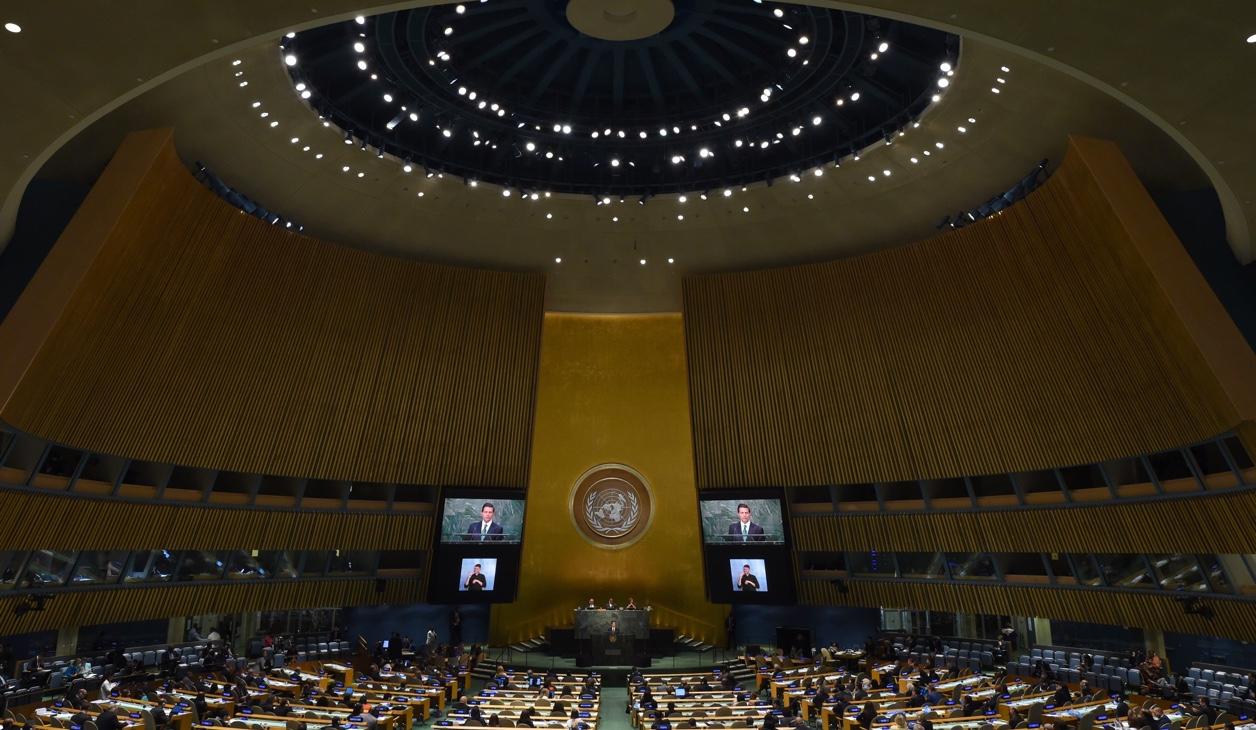It’s like peace, only different: Finding a solution to Syria
World leaders meet at the United Nations General Assembly in New York on Sept. 27, 2015.
Editor's note: This is Chatter, our morning rundown of what you need and want to know around the world. Fortunately for us all, you can have Chatter emailed to you every day. Just sign up here!
NEED TO KNOW:
Syria is now the center of the world.
The UN General Assembly, which after a weekend of feting its newly-stated goals of saving the planet, will now focus in on one of the world’s most intractable conflicts, and the two world-changing horrors that conflict has triggered: the Islamic State and the refugees crisis.
But there is not a whole lot of agreement about how to solve the problem in Syria. Syrian President Bashar al-Assad is a big part of that problem. The president remains in power, continuing his brutal, indiscriminate crackdown on Syrian towns and cities that are sympathetic to the rebellion. Yet the international intervention in Syria is so far almost solely focused on defeating the Islamic State.
The disagreements can pretty much be summed up by the stances of two countries: Russia and the United States. The United States blames Assad for everything. And, still wary of getting overly involved in a war in the Middle East, has been holding out for some kind of diplomatic solution that would lead to Assad’s resignation.
Russia, on the other hand, believes the Islamic State should remain the solitary focus, and is even closely working with Assad toward that end. Earlier this month, Russia set up a forward operating base in Latakia, a coastal Syrian city. And over the weekend it surprised the United States by striking a deal with Iraq and Syria to share intelligence about the Islamic State.
Most of the key players will step up to the lectern at the UN headquarters in New York this morning to share their thoughts on the issue. Obama and Putin will both speak publicly. Hassan Rouhani, the president of Iran, which is one of Syria’s most loyal supporters, will also speak. So will French President Francois Hollande, who over the weekend for the first time ordered air strikes on Islamic State targets in Syria. Leaders from some of Syria’s neighboring countries, which are swelling with millions of Syrian refugees, are expected to weigh in as well.
It’s going to be a long morning.
WANT TO KNOW:
A coherent strategy to end the war in Syria is urgently needed. Half of the country’s population is now either displaced or dead: 11 of 22 million people. Most of those are internally displaced, and fear daily for their lives. Another 4 million have crossed the border into Turkey, Lebanon, Jordan, Iraq and Egypt. A fraction of those have made it to Europe. If you want a sense of how bad it is, read this.
Inside Syria, even attempts at peace are fraught with danger. It was almost hard to notice, but late last week supporters and opponents of Assad agreed to a ceasefire that would be one of the most far-reaching of the war. The pact would end attacks in Zabadani, a city between Damascus and the Lebanese border, and in a couple villages in Idlib Province.
That all sounds great until you see the details of the deal. To achieve this peace, the two sides have essentially agreed to swap territory along sectarian lines. So all the Shiites in Idlib will be sent to government-held areas and all the Sunnis in Zabadani will be sent to rebel-held Idlib. It’s like peace, only different.
These kinds of forced sectarian divisions can’t be good for Syria’s future. But it’s a solution that will likely be floated seriously by someone at the United Nations today: divide Syria up into separate territories, all along sectarian lines. For the average Syrian, though, such a solution seems almost unthinkable. One Syrian, who lived near Zabadani but is now a refugee in Lebanon, told GlobalPost that at the beginning the sectarian nature of the war shocked him. He is Sunni. And he didn’t even know his best friend was Shiite until he was 19. Everything has changed.
STRANGE BUT TRUE:
Access to technology is not something one normally associates with a refugee. But the majority of Syrian refugees are not leaving home without it. Almost all of them carry smartphones of one sort or the other. They also carry with them multiple batteries.
They first use Facebook to find the groups that share information about routes, prices and smugglers. Then they use Google Earth and Google Maps to find their way across continents. And they use WhatsApp to communicate with friends and family, and to share their GPS locations.
But the internet isn’t always helpful. It is also, as we all know all too well, an incredible source of terrible and outright false information. At one point rumors spread that Germany was sending boats to Turkey and Lebanon to bring Syrians back to Europe. Syrians flooded embassies in Ankara and Beirut to inquire about the ships. When you are a refugee, such false information can be deadly.
We want to hear your feedback so we can keep improving our website, theworld.org. Please fill out this quick survey and let us know your thoughts (your answers will be anonymous). Thanks for your time!
